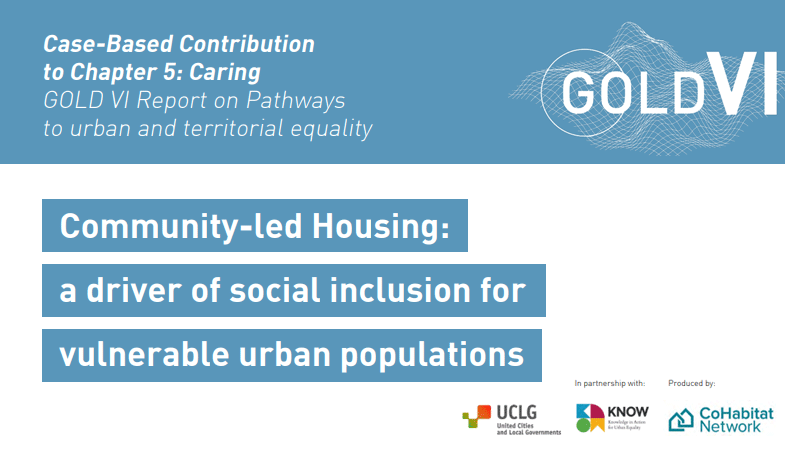La vivienda participativa como motor de la inclusión social de las poblaciones urbanas vulnerables
Actualizado elInforme GOLD VI
Como parte del informe GOLD V1 de CGLU que se publicará a finales de este año, la Red CoHabitat ha contribuido con una serie de estudios de caso basados en su experiencia de proyectos exitosos para superar las desigualdades urbanas y territoriales.
Aquí, UrbaMonde y World Habitat examinan cómo la vivienda participativa puede impulsar la inclusión social de las poblaciones urbanas vulnerables.
AUTORES
Nina Quintas (urbaMonde) y Mariangela Veronesi (World Habitat).
CIUDAD/PAISES CUBIERTOS
Estados Unidos, Canadá; Ginebra (Suiza); Sydney (Australia); Londres (Reino Unido).
▶ Lea el informe completo aquí (inglés,PDF)
SUMMARY
Community-led housing (CLH) is a key mechanism to deliver housing through non-speculative, affordable models, making cities and places more financially inclusive. In addition, CLH projects contribute to housing rights by offering more than just affordability. They also play an important role in integrating practices of care and addressing the needs of more marginalised communities, and/or groups with specific needs.
For example, student-led housing cooperatives emerged to facilitate the access to affordable housing for students, such as La Cigüe (Switzerland), NASCO (United States and Canada), or STUCCO (Australia). This also enables the right to education and improves life opportunity outcomes, especially for students without wealthy backgrounds. In addition, self-management also provides a supportive and enriching environment.
Tonic Housing was conceived to tackle the fact that, in addition to having care needs related to the process of ageing, older LGBTQ+ people tend to be disproportionately affected by isolation and housing insecurity. As a result, they have developed the first LGBTQ+ affirming urban community in the UK, which will jointly address inclusion, connectivity, sense of security, along with health and wellbeing. Their model is co-designed with a Community Panel to ensure that their housing and care solutions reflect the needs of a diverse community and take an intersectional approach.
CLH projects such as these can often be enabled or supported by public authorities, such as through leasing of land, finance or technical assistance. These partnerships generate great social value, with systems of support that are people-led and people-centred and which - though partially enabled by the local authorities - are also not dependent on direct public provision
▶ Lea el informe completo aquí (inglés,PDF)
